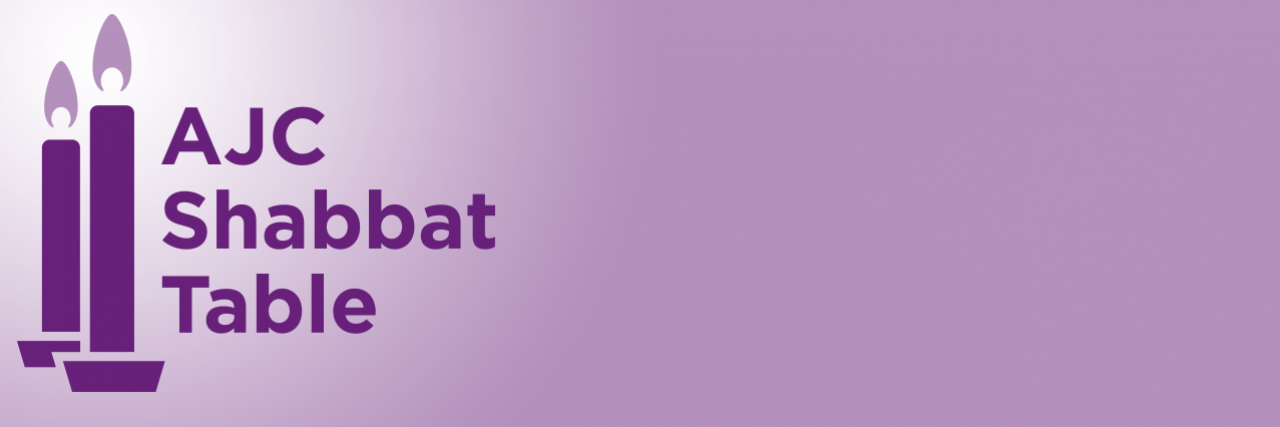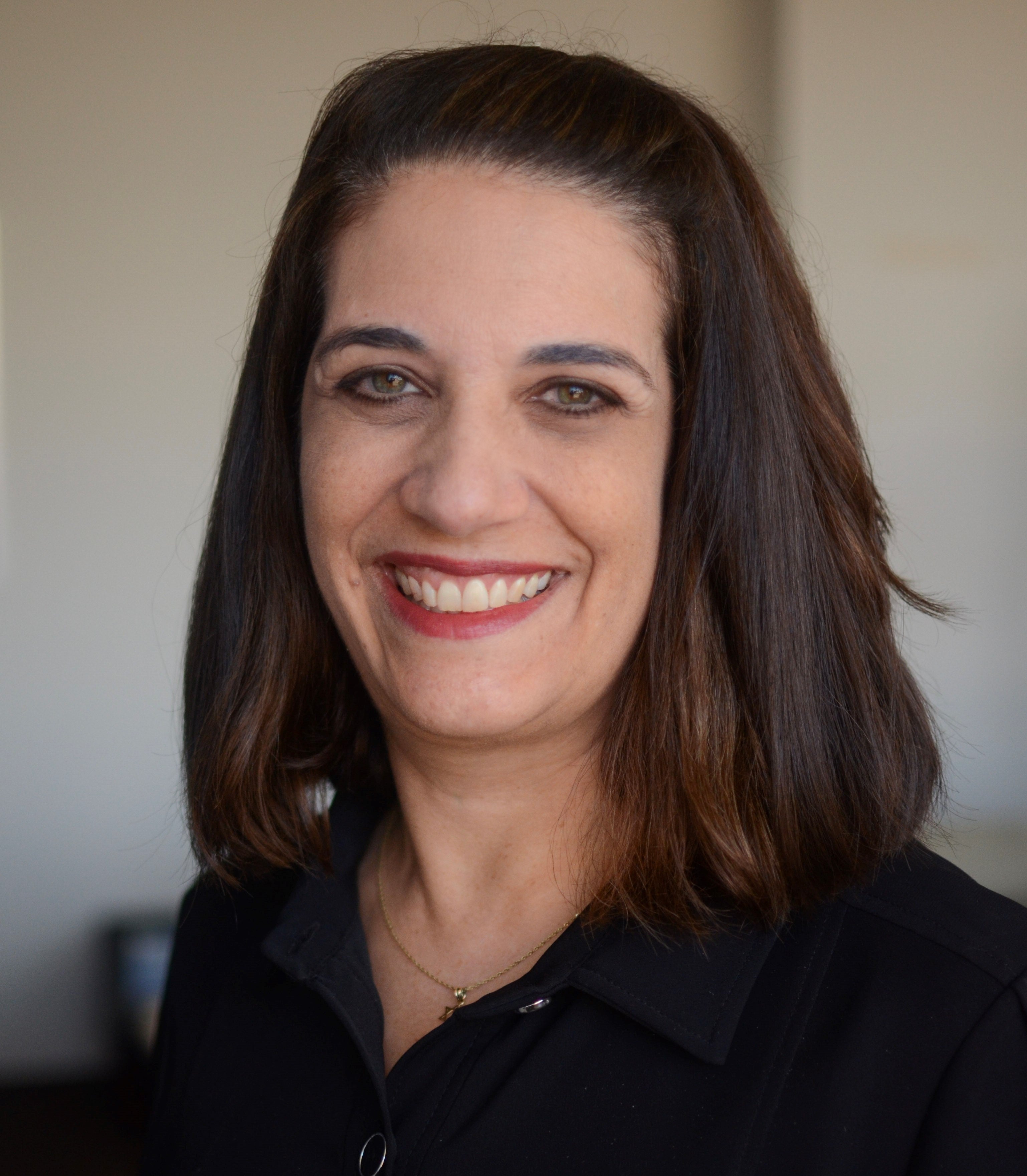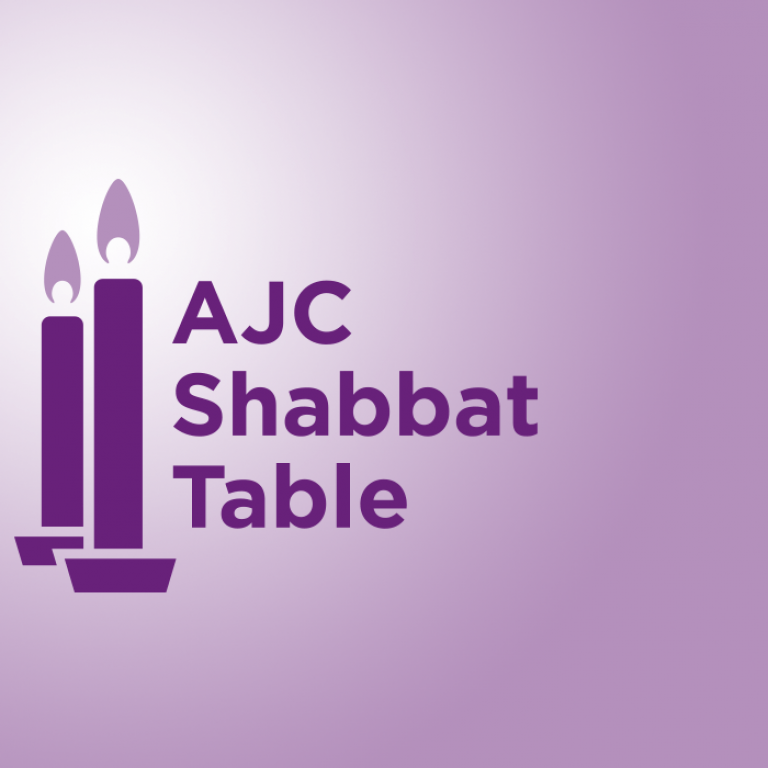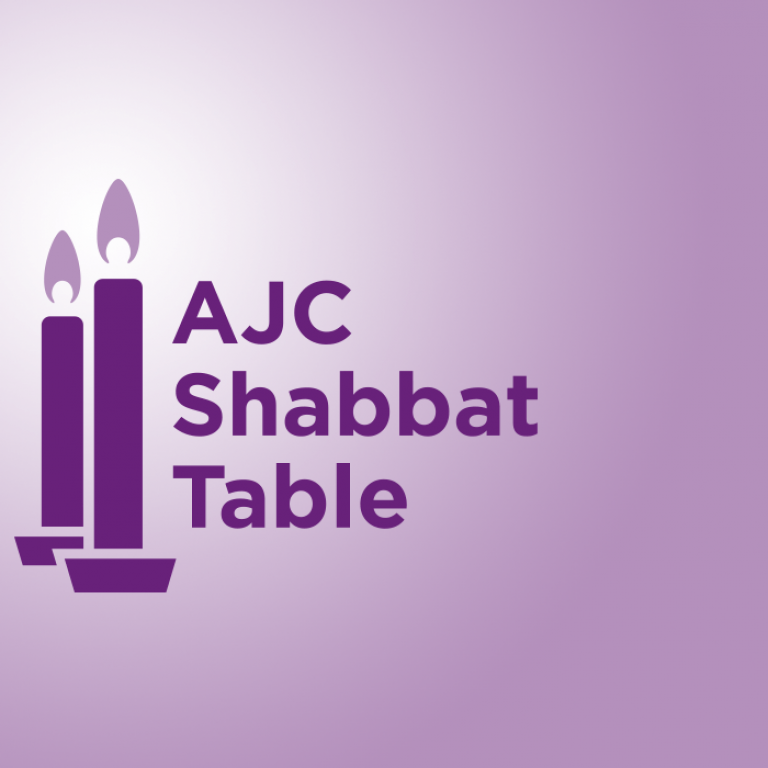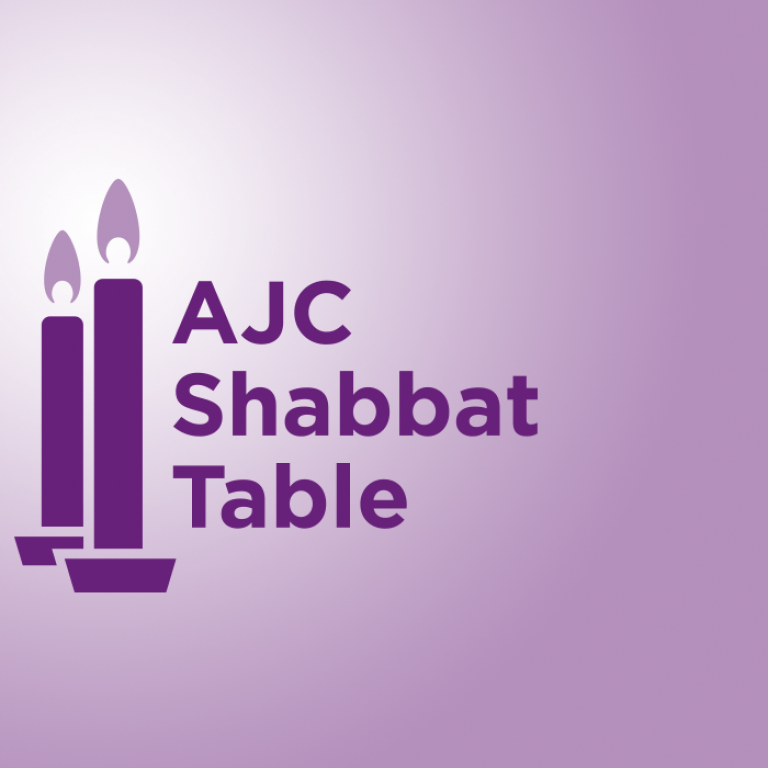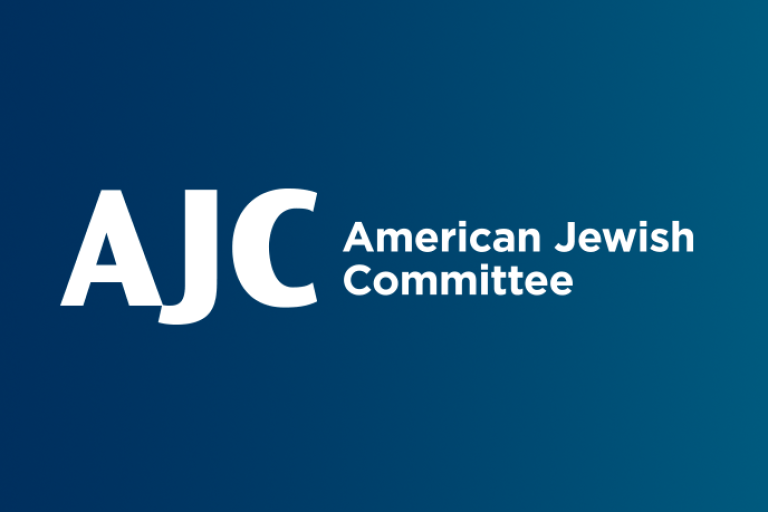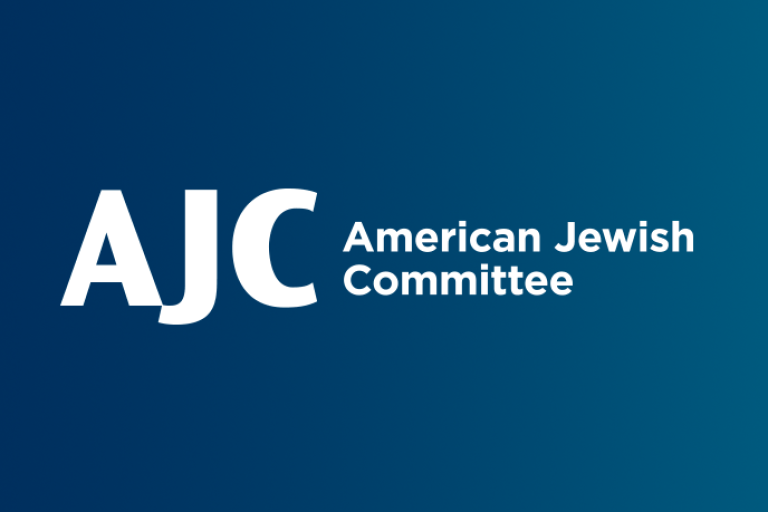July 31, 2020
Taking a break from our busy lives to rest and recharge has always been important. In these days when many of us are spending much of our time at home, in a time when technology has become even more critical to our ability to stay in touch with the world out there, taking some time to consciously “unplug” feels more critical than ever before. One of the greatest blessings of Jewish tradition is Shabbat, the day of rest on which we are commanded to do just that! For thousands of years, Shabbat dinner has been a time that Jewish families sit together to enjoy a leisurely and festive meal. We take the time to really enjoy each other’s undistracted company.
We hope that AJC’s Shabbat Table will enrich your Shabbat table. Whether you are a Shabbat dinner “regular” or whether you’ve never had Shabbat dinner as a family before, we hope AJC’s Shabbat Table will give you interesting and inspirational material to spur lively and meaningful conversations around your family’s dinner table.
Shabbat shalom!
This Shabbat: Shabbat Nachamu
This Shabbat has a special name: Shabbat Nachamu, the shabbat of comfort. Shabbat Nachamu is celebrated each year on the first shabbat after the fast day of Tisha B’Av, the 9th of the Hebrew month of Av, the anniversary of many tragic events in Jewish history, most famously the destruction of the Second Temple in Jerusalem by the Romans in 70 CE. Following the destruction of the Second Temple, Jews were exiled from the Land of Israel by the Romans, not to return to the land in significant numbers until the birth of Zionism in the late 19th century. Jews did not govern the land again until 1948 when the State of Israel was founded.
On Shabbat Nachamu, we read a special Haftarah from the Book of Isaiah that begins with the beautiful words “Nachamu, nachamu ami” - “Be comforted my nation.” These words feel particularly meaningful this year. As humanity remains in the clutches of a terrible pandemic and as American society is rocked by unrest and long overdue reckoning with systemic racism, we are all in need of comfort and reassurance.
Shabbat Nachamu has another layer of meaning for the Jewish community. The fact that Jews around the world continue to seek comfort for the destruction of the Temple affirms our millenia-long connection to the Land of Israel. In an era in which Israel’s very right to exist as a Jewish state is challenged, sometimes even by our fellow Jews, Shabbat Nachamu is a reminder that the Jewish relationship with the Land of Israel cannot be denied. On Shabbat Nachamu, we are comforted by the existence of a strong and stable State of Israel in the land that once witnessed our destruction and exile.
This week in Jewish history
July 31, 1961: The Millionth Oleh (Immigrant) Since the Establishment of the State Arrives in Israel
Israel’s Proclamation of Independence declared that the new Jewish state would be a place for “Ingathering of the Exiles,” where any Jew could arrive and instantly become a citizen. In the ensuing years, Israel lived up to its promise, taking in hundreds of thousands of Jewish immigrants from around the world, including those fleeing the Middle East, North Africa, and European post war Displaced Persons camps. And, Israel did not simply wait for Jews to come. In many instances, the government reached out to aid and rescue Jewish populations from nations where they were at risk.
When Israel was founded, it was home to only 650,000 Jews. Within only three years, that number had doubled, and by the tenth anniversary of independence, it had almost tripled! Absorbing such massive numbers of immigrants was not without challenges. The brand new, tiny, and beleaguered Israeli government, which had just finished fighting a war that threatened its very existence, struggled to provide housing, jobs, and even enough food to the new immigrants. Additionally, many immigrants, particularly Mizrachi Jews (those from Arab and North African lands) suffered rampant discrimination from their fellow Jews and from the Israeli government as well. While the legacy of discrimination should not be whitewashed, Israel’s absorption of one million immigrants by its “bar mitzvah” year was nothing short of miraculous.
August 1, 1944 - Anne Frank wrote the last entry in her diary
The Diary of Anne Frank is probably the most famous piece of writing to emerge from the Holocaust. Anne Frank was born in Germany in 1929, Her family fled to the Netherlands in 1933 to escape the Nazi regime, but soon found themselves back under Nazi rule when the Germans occupied the Netherlands in 1940. In July 1942, when Anne was thirteen years old, she and her family went into hiding in a secret annex in the office building where her father worked. Anne chronicled her life in hiding in her diaries over the course of the following two years, until her last entry on August 1, 1944. Three days later, on August 4, 1944, Nazi soldiers raided the secret annex, discovering the Jews hidden there. Anne, her family, and the four other Jews hiding with them were deported to concentration camps. Anne Frank died of typhus in Bergen Belsen in February 1945. Her diary, which is filled with her hopes, dreams, and struggles, remains one of the most read books in the world. Anne Frank’s words illuminate her humanity, and in so doing the humanity of each of the six million Jewish victims of the Nazi regime during the Holocaust.
August 6, 1865 - Jacob Schiff Arrives in America
Jacob Schiff was one of the founders of AJC and indeed one the most famous American Jewish leaders of the late 19th and early 20th centuries. Born in Frankfurt in 1847, Schiff came to America right after the Civil War at the age of 18. Schiff became a highly respected financier and banker, and a passionate advocate and philanthropist for Jewish causes. In 1906, after the Kishinev Pogroms, he was among the small group of men who founded the AJC in order to protect and defend Jews around the world. You can learn more about Jacob Schiff’s storied life and passionate advocacy for the Jewish people in AJC’s archives. (Just beware: if you are a history buff, you might end up lost in those amazing archives for hours and hours before you come up for air!)
For Shabbat Table Discussion: Antisemitism in America
In the past few weeks, antisemitism has once again reared its ugly head in America, with scandals over antisemitic statements and social media posts by TV host Nick Cannon and Philadelphia Eagles wide receiver DeSean Jackson rocking the entertainment and sports worlds. The antisemitic rhetoric has centered on the idea that Blacks are the “real Children of Israel” and that Jews have usurped their title in order to maintain Jewish “power.” Reaction to the antisemitic statements was mixed. Many, including the Philadelphia Eagles, the NFL, and a number of Black leaders, sports figures and entertainers condemned them. The Eagles levied an undisclosed fine against Jackson, and Viacom CBS ended its relationship with Cannon because of the statements. Both Jackson and Cannon apologized, expressing remorse for their actions. However, some in the Black community expressed their support of Jackson and Cannon’s statements, calling retribution against them “racist.”
In the wake of these scandals, three public figures - renowned basketball great Kareem Abdul-Jabbar, Atlantic writer Jemele Hill and author and sports writer Mitch Albom wrote widely-read articles about addressing antisemitism in the Black community and about why antisemitism is not condemned as quickly or as forcefully as racism.
Questions for discussion at your table:
- Why are statements calling Blacks the “real Children of Israel” antisemitic? Where do those statements come from?
- Do you think antisemitism is taken as seriously as racism in America? Should it be? Why or why not?
- In their apologies, both Jackson and Cannon expressed that they had been ignorant of much of the history of persecution of Jews, including the Holocaust. Why do you think there is so much ignorance about antisemitism in America today? Do you feel you know enough about the history of antisemitism in America?
Here are some resources for talking to your children about antisemitism in America:
- AJC’s Translate Hate unpacks antisemitic tropes and rhetoric that crop up in our modern discourse, explaining where they come from and why they are antisemitic.
- AJC’s 2019 Survey of American Jews on Antisemitism in America gives a picture of the concern and worry that American Jews feel about increasing antisemitism in America.
- AJC’s Advocacy Anywhere conversations with Dr. Lonnie G. Bunch III and Archbishop Wilton D. Gregory explore the fight against racism in America today and the relationship between the Black and Jewish communities both historically and in our present moment.
